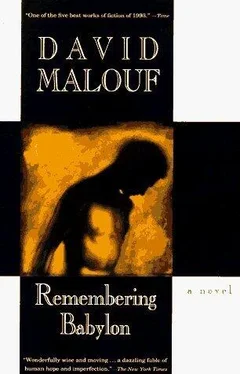Not at all, he insisted. He had come here entirely in his own right, on behalf — very briefly, though he feared not briefly enough, he tried to describe Gemmy, who was not very easily describable; how the man, through his knowledge of native life, had led him etc … It was enough anyway to satisfy Sir George that he was not one of a cabal, yet another subverter of the great design, and that his report was not part of a plan to entrap and discredit him.
But once the report was rendered harmless Sir George lost interest in it, and in Gemmy too. ‘Yes, yes,’ he muttered, ‘an interesting case — they are interesting people —’ but a moment later they had leapt to Hesiod and arrived, before Mr Frazer had quite caught up, at Homer, a frequent destination, he guessed, in Sir George’s conversational flights.
Sir George’s commission here is to call into existence a new self-governing state; in a land, territory rather, about the size of France and all the Germanies combined, wild, cut in two by the southern tropic, and largely, as yet, unpeopled. He is alternately intoxicated by the largeness of the undertaking and depressed that in being set down, at more than forty, at the ends of the earth, he may drop from sight. To keep his name before the Lords in Westminster he writes to one or another of them almost daily, describing in grandiloquent terms, all classical allusion and analogy, the names he has bestowed on a nameless part of the empire, the towns he has founded, the laws laid down. He sees himself as a kind of imperial demiurge, out of mere rocks and air creating spaces where history may now occur — at once the Hesiod of the place, its Solon, and its antipodean Pericles.
The archaic and the classical, indeed the prehistoric and the classical, exist side by side here and in the same moment. Sir George finds it entirely understandable that in the little coastal port he has honoured with his name a crocodile has been seen to emerge from the mud and waddle unperturbed about the main street, and that in his capital of a mere five thousand souls the monuments he is building, dome and portico, rise in incongruous glory above the backs of bullock teams, the curses of their drivers, and under the gaze of creatures, only recently redeemed from nakedness, whose minds are still sunk in unfathomable night.
They are in the age of wonders here, where forms, nameless as yet, are just beginning to emerge out of the dark, the dreamlike: the age of the hippogriff and demogorgon, of the heroes and demigods, too, of future legend, who just happen to have names like Jones and Dalrymple, and wear moleskins, or, as he does, the uniform of Her Majesty’s Colonial Service. ‘Your town,’ he writes to his patron, Lord Cardwell, of the little mosquito-infested port in the north on which he has settled that great man’s name, ‘lies in a position analogous to that of Thermopylae; that is, at the north end of the Australian Epirus’. In his mind, as it soars and hangs eagle-like over the great expanse of past and future, the local squattocracy, rough fellows most of them, are his squatter kings. ‘Runs (the colonial term for a wide-ranging pasture)’ he informs one of his Lordships, ‘seems a literal translation of  of Homer, where the shepherd kings feed their cattle in a similar climate to that of Arcadia. How refreshing among my daily cares are these classical analogies.’ Being escorted into a little western town of nine pubs and a butcher shop, by a party of two hundred stockmen, he sees himself riding in the company of attendant centaurs. Analogy is his drug. He finds it everywhere.
of Homer, where the shepherd kings feed their cattle in a similar climate to that of Arcadia. How refreshing among my daily cares are these classical analogies.’ Being escorted into a little western town of nine pubs and a butcher shop, by a party of two hundred stockmen, he sees himself riding in the company of attendant centaurs. Analogy is his drug. He finds it everywhere.
At eighteen he fell in love with the Mediterranean. Twenty years later he married into it. Lady Bowen, Roma Diamantina, is the daughter of the President of the Senate of Corfu, the Count Candiano di Roma.
Queensland, one has to say, was not Sir George’s first choice, but he is determined to make the most of it. He refuses to be put off by its failure at times to come up to the mark. His own mind knows no bounds. He is monstrously ambitious. What he fears is that if he is too successful here he will be taken for granted and overlooked; but there are occasions when he fears even more that he may be exposed , since the secret that gnaws his soul, child as he is of a Donegal rectory, is that he is an imposter.
Sir George, easy now, reaches behind him and slips from a shelf two little volumes of which he is himself the very modest author. Mr Frazer is impressed.
One is an argument in favour of the present island of Ithaca as the site of Homer’s island; the other an account of a journey on horseback, across Thessaly and the High Pindus, from Constantinople to Corfu. Sir George, it appears, has stood at the summit of all three classical peaks, Etna, Parnassus, Mount Olympus — a feat no other Briton has emulated. But when he opens the atlas he has recently commissioned, and they look together at the town there that bears Sir George’s name, Mr Frazer, remembering the scattered huts along the shore and the listless air about the jetty he sailed from, for he knows the actual place, feels his confidence in the Governor take a downward turn. A kind of gloom comes over him. Sir George, he decides, exudes an air of magnificent unreality that includes everything he looks upon. He has got close enough to feel its disintegrating effect in every part of him.
They do come back to his report, Sir George has read it. Perhaps now, Mr Frazer thinks, taking a firm hold on his own sinking spirits, we will get down to facts. In all this heady leaping about the globe he had grown more and more conscious of Gemmy, poor fellow; so real in the room that he can almost smell him, and, in a malicious moment, wishes Sir George could too.
But Sir George has no interest in facts. He takes the long view, the long high view, and from there, since his mind has the same capacity to leap centuries into the future as back into the past, the whole of time being its sphere, the vision Mr Frazer has outlined in his report of orchards, not of exotic (that is, European) but of native fruit, stretching in all directions to the skyline, had long since passed the arguing and planning stage, the clearing and grafting and seed-and-sapling stage, and is, in Sir George’s mind, accomplished. To descend to detail would be to miss the wood for the scrubby little trees. That sort of thing he leaves to those who have a talent for it, who love to burrow and bury themselves (he is glaring again) in minutiae, dull fellows, dull facts. Recovering quickly, he beams at Mr Frazer, whom he sees as a man, after all, consumed by an idea, with no one behind him, a man he can trust. He expresses his entire satisfaction with their little talk and invites him to dinner where he will have the pleasure (Sir George looks humorous) of meeting the Premier, Mr Herbert — and Lady Bowen, of course. Thursday then, seven sharp.
But at this descent to mere detail Sir George grows gloomy again, suspicious — or perhaps a new barb has found its mark and is working its slow poison in him. When Mr Frazer gets up to leave he has set his jaw and is gazing irascibly out the window towards the dispiriting bushland of the opposing shore.
Two nights later, in the prettily furnished dining room at Government House, they are four at table: Sir George; Lady Bowen, a fine, tall, dark-haired woman, not quite beautiful but with splendid shoulders and eyes; Mr Frazer himself; and the Premier, Mr Herbert, a very young man with soft fair hair and a large head, who has walked in the three miles from Herston, his estate on the edge of town, with his dog, Skip, and a basket of fresh vegetables.
Mr Herbert lives at Herston with his friend of Oxford days, Mr Bramston. The house, with its animals and its model garden, is a joint enterprise, as is suggested by the merging of the young men’s names — a Horatian retreat for Mr Herbert from the rough and tumble of colonial democracy, which he does not believe in, and the game, which does not quite suit him, of state-making.
Читать дальше

 of Homer, where the shepherd kings feed their cattle in a similar climate to that of Arcadia. How refreshing among my daily cares are these classical analogies.’ Being escorted into a little western town of nine pubs and a butcher shop, by a party of two hundred stockmen, he sees himself riding in the company of attendant centaurs. Analogy is his drug. He finds it everywhere.
of Homer, where the shepherd kings feed their cattle in a similar climate to that of Arcadia. How refreshing among my daily cares are these classical analogies.’ Being escorted into a little western town of nine pubs and a butcher shop, by a party of two hundred stockmen, he sees himself riding in the company of attendant centaurs. Analogy is his drug. He finds it everywhere.










